These remarkable rodents have the unique capability to reduce their body temperatures to freezing levels, entering a dormant state that can last for an impressive eight months.

In the quest to unravel the mysteries of human brain health, scientists at the University of Alaska Fairbanks have turned their attention to arctic ground squirrels
A groundbreaking study is underway, led by researchers keen to understand the secrets that enable these squirrels to endure such extreme conditions on the brink of life. The University of Alaska Fairbanks team is hopeful that these findings may pave the way for innovative approaches to treating injuries and diseases in humans.
As the investigation unfolds, the focus remains steadfast on deciphering the mechanisms that safeguard the squirrels’ brain health during their prolonged hibernation. The researchers believe that the clues hidden within the biology of these resilient creatures could unlock valuable insights into human brain health, potentially revolutionizing the way we approach neurological conditions.
The groundbreaking project, spearheaded by the University of Alaska Fairbanks, aims to shed light on the adaptability of arctic ground squirrels and their ability to thrive in harsh winter conditions
By closely examining the physiological changes and molecular processes occurring in the squirrels’ brains during hibernation, scientists hope to uncover novel strategies for preserving and enhancing human brain health. This pioneering research underscores the importance of studying nature’s extraordinary feats to advance medical knowledge.
The University of Alaska Fairbanks team is optimistic that their exploration into the secrets of arctic ground squirrels may hold the key to transformative breakthroughs in human brain health, offering new avenues for treating injuries and diseases that afflict the mind. As the study progresses, the spotlight on these resilient rodents becomes increasingly crucial in the pursuit of innovations that could significantly impact the future of neurological well-being.




